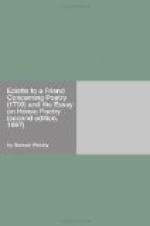Wesley’s attitude toward Dryden deserves a moment’s pause. In the “Essay on Heroic Poetry” he observed that a speech of Satan’s in Paradise Lost is nearly equalled in Dryden’s State of Innocence. Later in the same essay he credited a passage in Dryden’s King Arthur with showing an improvement upon Tasso. There is no doubt as to his vast respect for the greatest living poet, but his remarks do not indicate that he ranked Dryden with Virgil, Tasso, or Milton; for he recognized as well as we that the power to embellish and to imitate successfully does not constitute the highest excellence in poetry. In the Epistle to a Friend he affirmed his admiration for Dryden’s matchless style, his harmony, his lofty strains, his youthful fire, and even his wit—in the main, qualities of style and expression. But by 1700 Wesley had absorbed enough of the new puritanism that was rising in England to qualify his praise; now he deprecated the looseness and indecency of the poetry, and called upon the poet to repent. One other point calls for comment. Wesley’s scheme for Christian machinery in the epic, as described in the “Essay on Heroic Poetry,” is remarkably similar to Dryden’s. Dryden’s had appeared in the essay on satire prefaced to his translation of Juvenal, published late in October, 1692; Wesley’s scheme appeared soon after June, 1693.
The Epistle to a Friend concerning Poetry is neither startling nor contemptible; it has, in fact, much more to say than the rhymed treatises on verse by Roscommon and Buckinghamshire. Its remarks on Genius are fresh, though tantalizing in their brevity, and it defends the Moderns with both neatness and energy. Much of its advice is cautious and commonplace—but such was the tradition of the poetical treatise on verse. Appearing within two years of Collier’s first attack upon the stage, it reinforces some of that worthy’s contentions, but we are not aware of its having had much effect.




